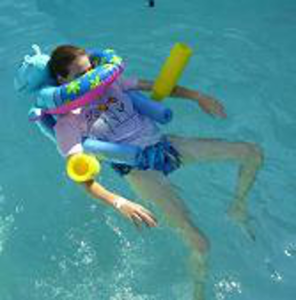Imperfect Specimens
 When I think of space, I think of Ender’s Game where Ender’s greatest strength was that he could see all the possibilities of zero gravity. He looked at space and realized there is no “up”. Recently, I’ve been following Commander Chris Hadfield’s journey, and I’ve been looking at space, wondering if there is no disability. This is way oversimplified and the answer is yes, there is still disability, but like everything else in space, it’s different.
Legs are for walking. Or running, jumping, climbing. Locomotion. But the thing is, legs evolved on a world with gravity. So when you get into orbit, legs, while not exactly useless, are certainly not going to be fulfilling their original job description. Hence the reason Lois McMaster Bujold introduced the concept of “quaddies”, genetically constructed humans with four arms, who were designed specifically to live and work in zero gravity. Because an extra pair of arms seems a lot more useful in space than legs.
When I think of space, I think of Ender’s Game where Ender’s greatest strength was that he could see all the possibilities of zero gravity. He looked at space and realized there is no “up”. Recently, I’ve been following Commander Chris Hadfield’s journey, and I’ve been looking at space, wondering if there is no disability. This is way oversimplified and the answer is yes, there is still disability, but like everything else in space, it’s different.
Legs are for walking. Or running, jumping, climbing. Locomotion. But the thing is, legs evolved on a world with gravity. So when you get into orbit, legs, while not exactly useless, are certainly not going to be fulfilling their original job description. Hence the reason Lois McMaster Bujold introduced the concept of “quaddies”, genetically constructed humans with four arms, who were designed specifically to live and work in zero gravity. Because an extra pair of arms seems a lot more useful in space than legs.
Now, Bujold writes science fiction, so I couldn’t trade my legs in for another set of arms even if I wanted to, but it does make me think
of zero gravity as an equalizer for paraplegics. It won’t matter if our legs don’t work because we wouldn’t need them all that much anyway. The only problem I can see is floating legs. I don’t have the muscles that keep my legs straight and together, so when I swim, they float every which way. Kind of amusing to watch, kind of annoying to swim with. And I imagine the same problem of weightless, uncontrolled limbs would crop up in zero gravity. I can just see myself typing away at some console and finding my foot brushing my ear. Though that’s easily fixed with a stick and some duct tape.
This is all a moot point because only the healthiest go to space right now, but we’re looking at a future where space travel will be as common as flights between continents are here on Earth. One day, people with disabilities could be astronauts.
And one of the things I find interesting is that the human body is not made for zero gravity, so even the most perfect specimens of humanity are at a disadvantage in space. They have to learn new movement patterns and develop different reflexes to cope and adapt to their new environment. Just like someone facing a disability for the first time. Maybe space programs should already be drawing from those of us with disabilities because we’re used to adapting to new circumstances and new ability.
I realize I’ve only explored a very narrow view of disability, namely lower body weakness, because that is what I’m most familiar with and what I’ve spent the most time speculating on. But there are hundreds of different disabilities out there that could also benefit from space travel, or be even more hindered by it. Let’s face it, quadriplegia is going to suck no matter what planet you’re on. Unless you find one where you can plug your brain into some kind of virtual reality. And I could see things like OCD or depression getting worse by being trapped in a box for six months.
Either way, I thought the concept was interesting and I’d love to explore more aspects of it. And now I think I’m going to have to write about a space cowboy with paraplegia because that is just too awesome to pass up.

